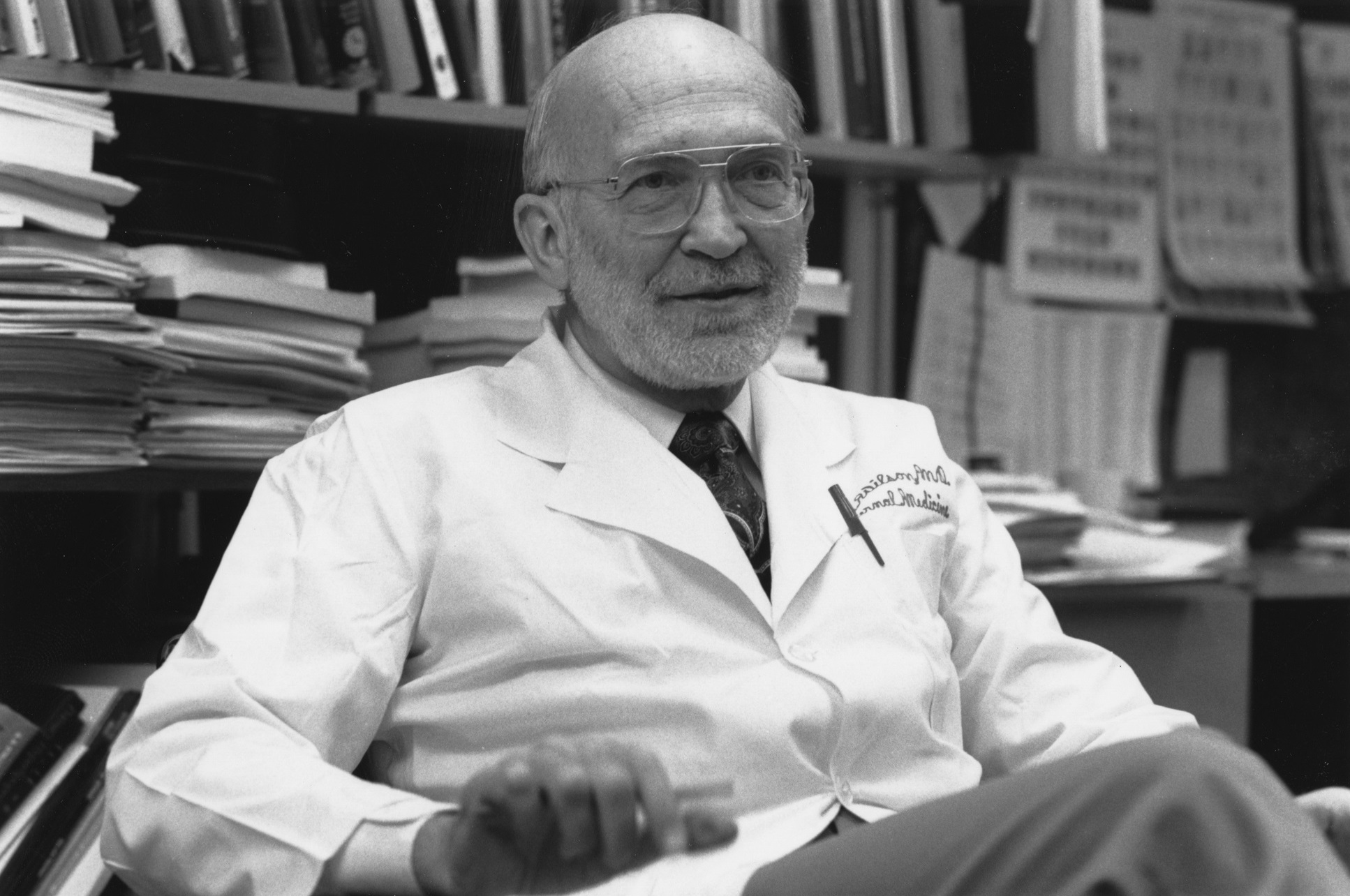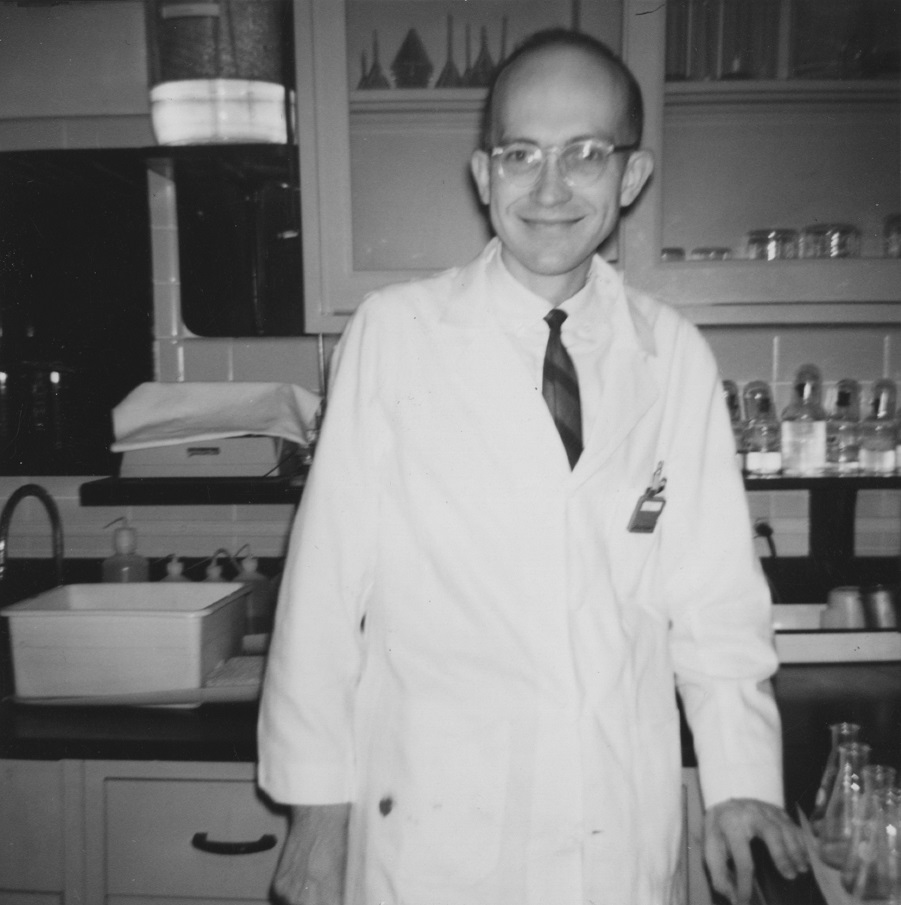Dr. Jean Wilson, an internationally recognized endocrinologist and Professor Emeritus of Internal Medicine at UT Southwestern Medical Center, died June 13. He was 88. Dr. Wilson held the Charles Cameron Sprague Distinguished Chair of Biomedical Research at UT Southwestern, where his laboratory research lasted six decades. His significant scientific discoveries led to profound insights into the mechanisms underlying sexual differentiation and to now widely used treatments for prostate disease.

Dr. Wilson’s humble and gentle spirit will be greatly missed by all of us who were fortunate to know him. He has left an enduring legacy at UT Southwestern, where he will be remembered as a caring colleague, investigator, mentor, teacher, and friend. We will always be inspired by his pioneering work and the many lasting discoveries he contributed to our world.
Kathleen M. Gibson, President and CEO of Southwestern Medical Foundation
Academic Achievements of Dr. Jean Wilson
Dr. Wilson’s research was largely responsible for current understanding of the mechanisms by which steroid hormones induce male sexual differentiation and was instrumental in identifying the scientific underpinnings of a widely prescribed class of drugs known as 5-alpha-reductase inhibitors to treat enlarged prostate and balding in men.
His discovery of 5-alpha-reductase and the identification of dihydrotestosterone as the primary hormone associated with the growth of the prostate transformed the understanding of and treatment for prostate disease, leading to the first medical therapy for benign prostatic hyperplasia.
Dr. Wilson’s research also created the groundwork for understanding differentiation of male and female genital development. He earned international distinction with his studies of testosterone formation, metabolism, and action in embryonic and postnatal animals, as well as in subjects with single gene defects that impair crucial steps in the process.
In addition to his contributions of scientific excellence, Dr. Wilson’s list of accomplishments and accolades is lengthy. He considered taking on his role as editor for The Journal of Clinical Investigation as one of the wisest decisions he ever made. He also edited two landmark medical textbooks, Williams Textbook of Endocrinology and Harrison’s Principles of Internal Medicine.
He was elected to the American Academy of Arts and Sciences (1982), the National Academy of Sciences in (1983), and the National Academy of Medicine (1994), as well as the American Philosophical Society to recognize his accomplishments. He was President of the Endocrine Society, the American Society for Clinical Investigation, and the Association of American Physicians and received prominent recognitions including the Kober Medal from the Association of American Physicians (1999); the Fred Conrad Koch Award from The Endocrine Society (1993); Gregory Pincus Award from the Worcester Foundation for Experimental Biology (1992); Henry Dale Medal from the Society for Endocrinology (1991); Amory Prize from the American Academy of Arts and Sciences (1977), and the Eugene Fuller Award from the American Urological Association.
At UT Southwestern, Dr. Wilson served as the first director of the Medical Scientist Training Program. The Physician Scientist Training Program in Internal Medicine was named the Jean Wilson Society in his honor, as well as the Jean D. Wilson Center for Biomedical Research and Jean D. Wilson, M.D. Distinguished Alumnus Lecture. The Center was established with support from Dr. Wilson and his sister, the late Dr. Margaret Sitton, to promote research in endocrinology, developmental biology, and genetics. They also established the J.D. and Maggie E. Wilson Distinguished Chair in Biomedical Research. Together, with the late Dr. Daniel Foster, Dr. Wilson was instrumental in establishing the Class of 1955 student scholarships.

Southwestern Medical Foundation Trustee Marvin J. Stone, M.D., MACP, FRCP, shares detail of the lasting gifts of Dr. Wilson, “Jean Wilson grew up in the Texas Panhandle and became one of the leaders in academic medicine during the latter half of the 20th century,” said Dr. Stone. “An early protege of Donald Seldin at UT Southwestern, Wilson was a classic triple threat: expert in his clinical field, brilliant investigator, and revered teacher. He also served as chief editor of Harrison’s Principles of Internal Medicine, the largest selling medical textbook in the world.”
Jean Wilson’s Early Life
As a young boy, Dr. Jean Wilson developed a keen interest and curiosity about the world from his parents, who were both teachers and were the first generation in their families to attend college. When he was 11, his interest in science was sparked after he received a chemistry set. For many years, he wavered between his calling to serve through science or religion. Ultimately, he chose science and served humankind nobly throughout his career with lasting contributions in science and compassionate service.
Dr. Wilson earned his undergraduate degree in chemistry from The University of Texas at Austin. In 1955, he entered UT Southwestern Medical School, the same year that Dr. Donald Seldin was named the new Chairman of Medicine. Dr. Seldin would become one of Dr. Wilson’s most important mentors throughout his career. After completing a residency in internal medicine at UT Southwestern and Parkland Health & Hospital System, he spent two years as a researcher at the National Institutes of Health before joining the UTSW faculty in 1960.
Dr. Seldin did a phenomenal job of creating an exciting learning environment and scientific environment. I worked in his lab the summer after my junior year in medical school, and there I chose the problem that I worked on for the rest of my life: how hormones act.
The late Jean Wilson, M.D., said in a 2012 interview by The American Society for Clinical Investigation.
Dr. Wilson’s Research
Dr. Jean Wilson’s career spanned six decades at UT Southwestern, where he furthered discovery in:
- Cholesterol metabolism
Dr. Wilson developed methods for quantifying cholesterol synthesis, absorption, degradation, and excretion in lab animals. Together, these analytical methods served as tools for understanding the feedback control of cholesterol synthesis and turnover. In addition, Dr. Wilson demonstrated that plasma cholesterol is synthesized in the intestinal wall and liver, findings that helped researchers define the contributions of diet and endogenous synthesis to cholesterol turnover in humans and other primates.
- Male androgens
Concurrently, Dr. Wilson studied the action of male androgens, focusing on testosterone and its metabolite, dihydrotestosterone. Starting with a collaboration with his postdoctoral fellow, Nicholas Bruchovsky, in 1966, the researchers discovered that testosterone is converted inside prostate cells into dihydrotestosterone, a more potent androgen that is responsible for most of male sexual maturation and male sexual function. Dr. Wilson and his colleagues later showed that mutations that impair either the synthesis of testosterone, the conversion of testosterone to dihydrotestosterone, or the function of this metabolite’s receptor protein are the most common cause of birth defects associated with incomplete development of the male urogenital tract, affecting about four in every 1,000 boys. Cloning these responsible genes eventually allowed researchers to identify asymptomatic carriers of these mutations.
- Dihydrotestosterone
Dr. Wilson also discovered that excess dihydrotestosterone is responsible for benign prostatic hyperplasia (BPH), or prostate enlargement, a condition that affects about 210 million men worldwide. Dihydrotestosterone is responsible for prostate growth in all male mammals, but in humans and dogs, prostate growth continues throughout life. Wilson and his colleagues showed that local excess of this potent androgen leads to prostate overgrowth. By curbing its production by inhibiting 5a-reductase, the enzyme that converts testosterone to dihydrotestosterone, they were able to prevent BPH in dog models of this condition. These findings have been developed into multiple 5a-reductase-inhibiting pharmaceuticals to treat this condition in human patients.

